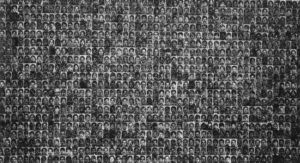Recent Young Adult Blog Posts
Statement supporting student activism on Gaza
The UU College of Social Justice, in collaboration with Side with Love and the Youth and Emerging Adult team of the Lifespan Faith Engagement office joins in solidarity with Unitarian Universalist young adults and students across the globe who are protesting the...
Behind Every Face, A Story
Behind every mask there is a face, and behind that a story. — Marty Rubin

Print by Bai Yiluo, Collective Identity
If someone were to walk up to you and ask, “who are you?”, what would you say? Would you give them your name, your family background, a physical description, your likes, your dislikes? Do any of those ever feel like satisfying answers? Can we really grasp and communicate the essence of who we are? Do we even know?
This week we’re venturing into the complex questions that arise when talking about identity. Movements for political and social change have always had complicated relationships with the question of identity, and it can be a powerful exercise to spend some time reflecting on your own sense of identity, some aspects of which may even be shifting.
We invite you to think not only about what influences and makes up your identity – be it your personal traits, family, life events, personal choices, institutions, media and society, cultural recognition, socialization – but also about the particular “lenses” you wear, lenses through which you see and experience the world. These different lenses, different aspects of our identities, can have profound political aspects and carry with them differentials in privilege and power.
The intention is not to put ourselves or anyone else in a series of categories, but rather to engage in a process of understanding where each of us comes from and how the component parts of our identities intersect and make us whole, while recognizing what informs our perspectives, and how our lenses and identities shape our efforts to build toward a more just world. Seeing ourselves more clearly helps us see each other and our world more clearly.
READ: The Complexity of Identity
To understand more about how issues of race, class, privilege, and power shape our perspective, read “The Complexity of Identity: Who Am I: (PDF)” by Beverly Daniel Tatum. In the five-page article, Tatum discusses some of the aspects of identity that can place an individual in a dominant or advantaged social group.
WATCH: #RaceAnd
#RaceAnd is an 8-part video series produced by Race Forward which explores the myriad of ways that race intersects with other issues faced by people of color. The videos are short, so I encourage you to watch all eight if you have the time!
ACT: Identity Map
Take some time to think about the various identities you hold. Common factors to consider include race, class, gender, religious affiliation, age, or affectional orientation. You might also consider roles that you identify with (i.e., daughter, spouse, father, teacher) as well as experiences (i.e., cancer survivor) and traits (outgoing, introverted, etc).
Once you’ve given some thought to your identity, take a blank piece of paper and write your name in the center. Next, in a somewhat random, web-like fashion, quickly jot down the many identities you hold. Show identities that are more important to you in larger print with smaller print for identities that are less important.
REFLECT & SHARE
Post a short reflection on Facebook or the Google Drive to let us know how this exercise went for you.
You’re invited (if desired) to use one or more of the questions below as prompts, come up with your own reflection (in photos, drawings, song, etc.) or you’re welcome to share your identity map.
- Looking at your identity map, do you find that you identify as part of any dominant groups — ones privileged by our society?
- Are there oppressed groups that you are part of?
- Can you think of unearned privileges you enjoy in our society as a result of one (or more) of your identities?
- What aspects of your identity are most important to you?
- Are there any aspects of your identity that are in conflict with each other?
- Does geography influence your identity? If so, how?
- How much control do you have over determining your identity?
CLOSING POEM
Read the short poem Marginal Wisdom by Leslie Takahashi Morris.
ADDITIONAL RESOURCES
Selections from “In the Name of Identity”
This selection is a very accessible and engaging exploration of the complexities of navigating identity by Lebanese-French writer Amin Maalouf.
Can Stories Overcoming Identity Politics?
Turkish writer Elif Shafak talks to NPR about how identities can sometimes imprison and separate us and how stories have the capacity to build bridges across cultures and identities.

